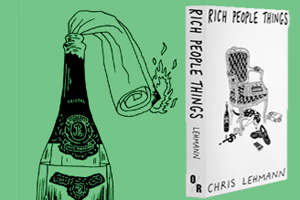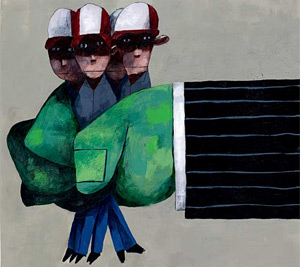
<a href="http://www.orbooks.com/our-books/richpeople/">Illustrations by Peter Arkle / OR Books</a>
The following is an excerpt from Rich People Things by Chris Lehmann (OR Books). Read his column of the same name at The Awl. Watch the book trailer here.
If markets truly do possess “tipping points”—those storied moments when they spontaneously rearrange themselves in mystical accordance with the general will—then our recent economic calamity should have produced a revolution in our common tongue. For the argot of economic specialization has long been an almost perfect inversion of how we actually live our productive lives. In the late years of the aughts, we’ve seen no end of billowing, multisyllabic abstractions take on lethally precise traits of social destruction. Collateralized debt obligations, credit default swaps, mortgage-backed derivatives, securitized risk—all these concepts, and (just as important) the words used to characterize them, seem in retrospect to be the kind of incantation worthy of the great Harry Potter villain Lord Voldemort, an evil force far too potent to have his name spoken aloud.
And so it is, one might argue, with the forces that have so deeply deranged our common life. As the investment economy laid siege to the American moral imagination in the past twenty-odd years, we seemed instinctively to realize that there was something dangerous in saying outright just what the thing was actually doing. And so we entered a true golden age of bloodless euphemism, affixing no end of harmonious social modifiers to the term “economy” as a bold sort of speech-act—”new information,” “knowledge,” “digital,” and “soft.” We often used such terms interchangeably to mean, roughly, “postindustrial” and always employed them with the same reverent certainty that accompanies the more familiar catechisms of the High Church.
As with the older spiritual acts of prayer, the great age of post-productive euphemism has been an exercise in perfecting word formations in the pure conviction that the wishing would make it so. The ideas that bound us to the old industrial order—the site of so much social conflict and gray ideological neurosis—were suddenly melting into air, and new ways of thinking now had to summon forth an entirely new way of being in the world. In time, even the notion of an “economy” seemed inadequate to describe the great social transformations we were living through. One heard of “telecosms,” “the long boom,” “big sorts,” “long tails,” and “the wisdom of crowds”—even, lo and behold, the endlessly comforting notion that “everything bad is good for you,” as one popular work of cultural theory had it at the height of millennial-boom culture. Social virtue had become a frictionless software application, and the economy was delivering fundamental change at a clip far faster than our meager Industrial-Age brainpans could assimilate it all.
However, for the people still actually working in the American economy—those who had been denied these wondrous powers of social prophecy—things looked very different indeed. Social inequality—measured by the gap between the highest and lowest percentiles of income earners, sharpened throughout the Clinton years, the moment when we were vouchsafed most of these soothing visions of the New Information Valhalla. And things got implacably worse during the Bush years, with extremely prejudicial tax cuts redistributing wealth upward, as the speculative paper economy not only crowded out conventional productive enterprise, but also hollowed out the financial foundations of our homes. The Bush years saw the first five-year period of economic expansion in modern US history that produced no increase in median wages. Instead of recognizing this for the distressing structural defect that it plainly was, Bush economic officials rallied to find inventive new ways of appeasing the investor class. In 2005, for instance, SEC chairman William Donaldson was effectively cashiered for advocating unpleasant levels of transparency, for shareholders and financial markets alike. His replacement, former California Republican Representative Christopher Cox, was overtly tasked with keeping the great Wall Street barbecue going. Housing prices and derivatives markets continued soaring upward, until they, well, didn’t.
What’s most striking about the long unwinding of this speculative nightmare is the still-impoverished vocabulary we are condemned to use in our efforts to explain just what’s happened to us. The usual storehouse of red-faced business-press expressions such as “downturn” and “recession”—and even their more-robust variants such as “collapse” and “meltdown”—seemed like so much pallid, inadequate phrasemaking compared to the scale of the disaster upon us. Faced with the prospect of the full-tilt collapse of global financial capitalism, we were left with terms almost solely of the government’s devising—expressions such as “too big to fail,” “troubled assets,” “frozen credit,” and “mark to market.”
In this atmosphere, many sturdy advocates of plutocracy are still protesting the expression “predatory lending”—which seemed, under the circumstances, a fairly generous way of putting things—as an overly loaded phrase that in any event couldn’t possibly describe an actual market phenomenon. People entered into ARMs and nothing-down loan arrangements voluntarily, after all, and the merchants of capital were furnishing them with unprecedented access to credit. Couldn’t they be a little more grateful, for God’s sake? As mortgage economist Arnold Kling harrumphed over Congress’s plan to institute a modest Consumer Financial Protection Agency, “The idea of predatory lending is to saddle the borrower with an expensive mortgage so you can foreclose on the property and sell at a profit.” Disbelievingly, he asks, “Have you read of a single instance in the past three years when the bank made a profit on a foreclosure?” It therefore follows, of course, that while poor people may be worthy of some abstract pity “because of their poverty…I cannot feel sorry for somebody who was given a basically free option on a house and the option didn’t happen to come into money.”
All socially acceptable talk of predation, bizarrely enough, has been reserved for the poor saps trying to hang onto criminally overvalued mortgages in the wake of the great ’08 reckoning. Consider the famed on-air outburst of the petty and indignant CNBC market correspondent Rick Santelli—speaking on the floor of the Chicago-based futures exchange, the CME Group. This moment served as “the founding document of the Tea Party movement,” in the judgment of conservative political writer Michael Barone. And like that movement’s entire antigovernment platform, it is a staggering display of incoherent socio-economic entitlement. “This is America!” Santelli egged on his cheering on-camera audience of brokers. “How many of you want to pay for your neighbor’s mortgage that has an extra bathroom and can’t pay the bills?”
No one—least of all the putative economic correspondent and his admiring retinue of traders—paused to reflect that, in the vast majority of cases, those mortgage holders were the least consequential players in a global chain of securitized debt that ran into the trillions of dollars. Far less did anyone on the CME floor interrupt to mention the kinds of domestic improvements that they had managed to fund, free and clear, via the upstream fees they collected on mortgage-backed derivatives. The spectacle of Santelli’s staged “rant” was very much like seeing a room full of arsonists, reeking of flame accelerants, blaming a citywide conflagration on a single defective fire hydrant.
But it’s an awkward business, owning up to the way the model of one’s profession is founded on what amounts to a long-term formula of financial ruin. Better, by far, to summon the sinister wheezing specter of communism. “Cuba used to have mansions and a relatively decent economy,” Santelli huffed. “They moved from the individual to the collective and now they’re driving ’54 Chevies—the last great car to come out of Detroit.” (Because, you see, it’s not sufficient merely to demonize the mortgage holders tricked out of their unrecoverable nest eggs by the financial industry; no, to do the job right, one has to work in a gratuitous attack on the heavily unionized American auto workforce.) By the time he was winding down, Santelli was summoning the spirit of the Founding Fathers—”What we’re doing now in this country would make them roll over in their graves”—and announcing that, yes, “We’re thinking of having a tea party in Chicago this July.
It’s bracing, in the face of such vicious, analytically empty showboating, to recall that things were not ever thus when American citizens contended with the wreckage of a money culture. When notions of economic justice and equality still figured prominently in our political debate, past financial abuses were described openly as treasons, infamies, or crimes. Indeed, the postbellum Greenback Party adopted as its rallying slogan “the Crime of ’73″— referencing the retirement of Civil War paper currency in favor of the gold standard. As a straightforward description, it was entirely apt, considering the swiftness with which the resumption of gold dispatched an entire generation of farmers, small producers, and laborers into debt peonage. Their perpetrators, meanwhile, were graced with vivid—and usually spot-on—descriptors that combined moral assessments of their deficient characters with a visceral sense of the damage they’d wrought on the republic. They were “bloodsuckers,” “plutocrats,” “brigands,” and “robber barons.” When nineteenth-century orators were feeling more philologically minded in their abuse, the lords of commerce would be described as “Croesuses,” “Judases,” “Caesars,” “Neros,” “Pharaohs,” and “the pagan worshipers of Moloch.”
This earlier vocabulary of financial crime was a crucial orienting device. It permitted its users to envision the otherwise harsh and impersonal workings of the market as a reflection of fallen human nature, as opposed to a remorseless, undeviating natural law. Indeed, where the older rhetoric of economic confrontation was visceral and personal, the governing rhetoric of latter-day financial crises is studiously ambient and clinical. To take just one example, these crises are no longer spoken of, as they were in the late 19th Century, as “panics”—a word that admirably summons the vivid, all-too-human feeling that accompanies the realization that an investment, a securities deal, or, indeed, an entire speculative sector has become a worthless stack of paper. Instead, the evermore frequent maladies of the investment world are now depicted as mysterious, causeless epidemics—”infecting” foreign markets, accruing “toxic” debt, moving “risk” around in ways that ultimately only made markets that much more risk prone.
As the Santelli episode makes clear, what’s surpassingly odd about our present vocabulary for economic affairs is that it tends to sound most specific precisely at its points of greatest analytical vagueness. Any casual reader of the business press knows that the threat of “class warfare” is omnipresent and to be smote ever vigilantly. But those who would actually prosecute this species of war are maddeningly diffuse and anonymous. They certainly can’t be labor militants, with just 7 percent of the private-sector workforce now belonging to unions. Nor can they be the sort of socialist intellectuals who’d formed the backbone of the heady New Left uprisings in places like Paris and Prague. Our intellectual class has grown far too jaded and media addled for any dalliance with ideas of mass social rebellion. Socialism itself is dead as an ideological force. It’s only spoken of now as a mysteriously viral trait held in common among our elite liberal governing class—sort of like an embarrassing sexually transmitted disease picked up at an Ivy League reunion. Socialism no longer serves as a universal rallying cry to the disenfranchised; it is, rather, an irksomely gnomic floating signifier, used here to describe the alleged redistributionist schemes of an Obama economic team dominated by investment bankers, and there to decry a health-care reform plan that is nearly a letter-perfect replica of the plan offered up by congressional Republicans in 1993.
No, the specter of popular resistance in our economic order is very much akin to the character of our late high-bubble prosperity: It is a multileveraged asset, tapped out for opportunistic cable-shouting fodder, that actually conceals enormous deficits in the American social imagination. Only our beleaguered heritage of economic populism won’t ever find itself on the receiving end of a federal bailout; its only hope of revival is for us to start thinking, and acting, differently as we finally begin to ask who benefits from a system that remorselessly distributes wealth upward, while socializing risk downward.














